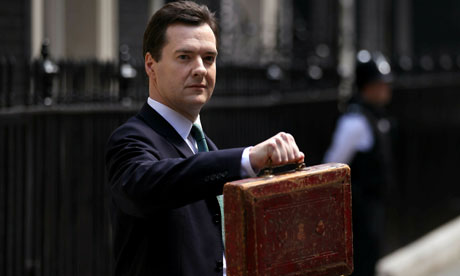Budget will cost 1.3m jobs - Treasury
Exclusive: Leaked government data concerning next five years shows hidden costs of austerity drive

Unpublished estimates of the impact of the biggest squeeze on public spending since the second world war show that the government is expecting between 500,000 and 600,000 jobs to go in the public sector and between 600,000 and 700,000 to disappear in the private sector by 2015.
The chancellor gave no hint last week about the likely effect of his emergency measures on the labour market, although he would have had access to the forecasts traditionally prepared for ministers and senior civil servants in the days leading up to a budget or pre-budget report.
A slide from the final version of a presentation for last week's budget, seen by the Guardian, says: "100-120,000 public sector jobs and 120-140,000 private sector jobs assumed to be lost per annum for five years through cuts."
The job losses in the public sector will result from the 25% inflation-adjusted reduction in Whitehall spending over the next five years, while the private sector will be affected both through the loss of government contracts and from the knock-on impact of lower public spending.
The Treasury is assuming that growth in the private sector will create 2.5m jobs in the next five years to compensate for the spending squeeze. Osborne said in last week's speech that tackling Britain's record peacetime budget deficit would help keep interest rates low and boost job creation. "Some have suggested that there is a choice between dealing with our debts and going for growth. That is a false choice." However, investors are increasingly nervous about the lack of growth in the world economy. The FTSE 100 fell more than 3% yesterday as fresh jitters hit confidence.
The opposition and trade unions said the unpublished Treasury forecasts backed up their argument that the unprecedented scale of the cuts in public spending would hamper Britain's recovery from the deepest and longest recession since the Great Depression.
Alistair Darling, the shadow chancellor, said: "Far from being open and honest, as George Osborne put it, he failed to tell the country there would be very substantial job losses as a result of his budget.
"The Tories did not have to take these measures. They chose to take them. They are not only a real risk to the recovery, but hundreds of thousands of people will pay the price for the poor judgment of the Conservatives, fully supported by the Liberal Democrats. It shows the risks they are prepared to take. If they get it wrong, those people losing their jobs will not get back to work."
Osborne said last week that his newly appointed panel of outside experts – the Office for Budget Responsibility – believed the jobless rate would soon start to improve. "The unemployment rate is forecast by the Office for Budget Responsibility to peak this year at 8.1% and then fall for each of the next four years, to reach 6.1% in 2015," he said. This forecast was fleshed out in the Treasury's Red Book, which says: "The decline in employment appears to be coming to an end and we expect a modest recovery in employment in the second half of 2010."
From next year, officials believe that stronger growth and a rising working population will lead to an acceleration in jobs growth. Over the five-year period from 2010 to 2015, the Treasury assumes that employment will rise from 28.8m this year to 30.1m in 2015, despite the loss of jobs caused by spending cuts.
The TUC general secretary, Brendan Barber, said: "With Treasury figures revealing that spending cuts will hit private sector jobs harder than those in the public sector, it is absurd to think that the private sector will create 2.5m new jobs over the next five years."
"This is not so much wishful thinking as a complete refusal to engage with reality. Much more likely are dole queues comparable to the 1980s, a new deep north-south divide and widespread poverty as the budget's benefit cuts start to bite. Many will find that a frightening prospect."John Philpott, chief economist at the Chartered Institute for Personnel and Development, said: "There is not a hope in hell's chance of this happening [the creation of 2.5m new jobs]. There would have to be extraordinarily strong private sector employment growth in a … much less conducive economic environment than it was during the boom."
The CIPD has estimated that there will be 725,000 jobs lost in the public sector alone by 2015, although Philpott said the number could be lower if the government succeeded in pushing through pay cuts.
He added that Osborne was expecting a similar rise in employment over the next five years to that seen during 13 years of the last Labour government, when around a third of the employment growth came from the public sector. "This is a slower growth environment and there will be no contribution from the public sector."
Last night David Miliband, one of the candidates for the Labour leadership, said: "This proves what we feared but the government kept secret. The budget will slash jobs not create them, and the least well-off will pay the highest price."
Andy Burnham, another of the Labour leadership candidates, said: " The human cost of Osborne's budget is now clear, despite his best efforts to hide it."
【source】
No comments:
Post a Comment